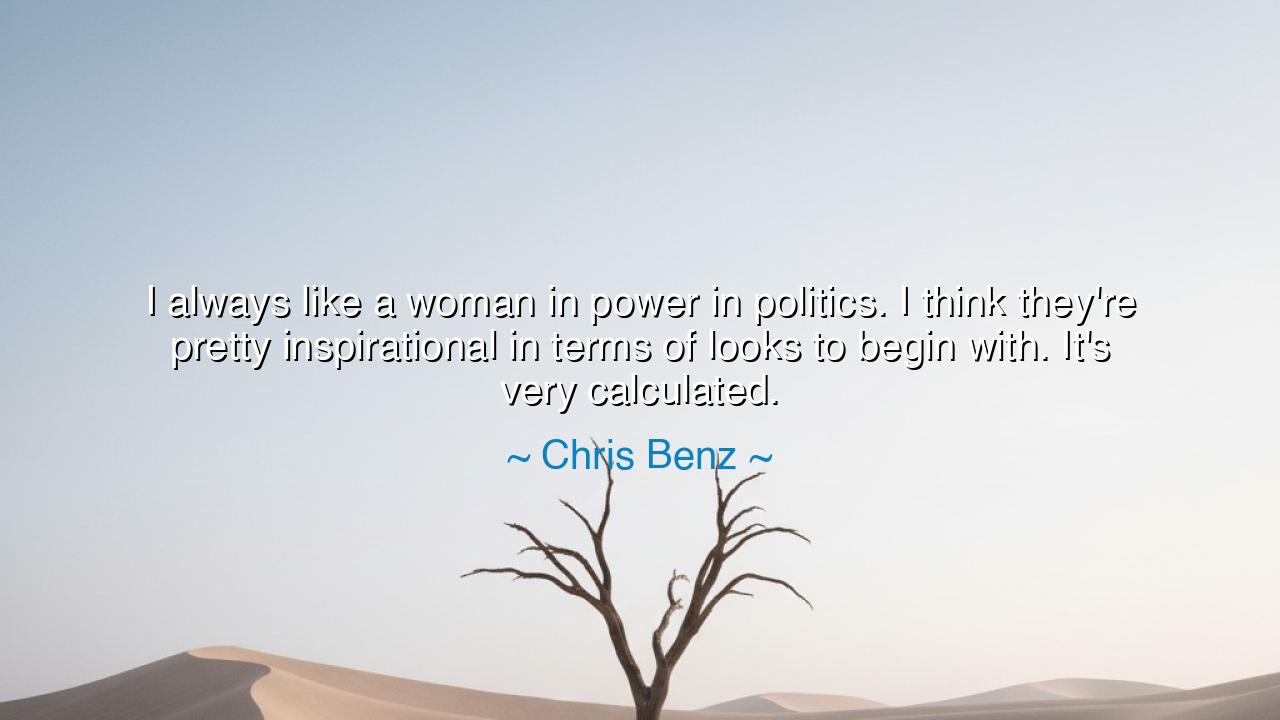
I always like a woman in power in politics. I think they're
I always like a woman in power in politics. I think they're pretty inspirational in terms of looks to begin with. It's very calculated.






In the words of Chris Benz, the designer whose art lies not only in fabric but in the understanding of form and power, we hear a curious truth wrapped in wit: “I always like a woman in power in politics. I think they're pretty inspirational in terms of looks to begin with. It's very calculated.” Though on its surface it may seem a light remark, it hides a profound observation about strength, identity, and the language of presentation. For in every age, power is not merely spoken — it is worn. The outward form becomes the vessel of the inward fire.
Benz, a creator of fashion, perceives what philosophers and poets have long known: that appearance is not vanity, but a form of expression, a language of power. When he speaks of women in politics being “inspirational in terms of looks,” he does not praise them for ornament, but for the symbolism of their composure. Their style — deliberate, poised, calculated — becomes armor. It is the modern echo of the ancient warrior’s shield, a declaration of confidence and control in a world that still questions the strength of the feminine. In this way, Benz’s words rise beyond fashion and touch upon philosophy — the eternal art of turning vulnerability into vision.
From the courts of queens to the chambers of parliaments, women in power have always known this silent art. Consider Cleopatra, whose beauty was not her only weapon, but her intellect, her charisma, her mastery of presentation. Every gesture, every robe, every glance was calculated not to deceive, but to command — to make her presence felt before her voice was heard. Centuries later, Margaret Thatcher, “the Iron Lady,” understood the same truth. Her crisp suits, her composed hair, her unyielding gaze — all these were her banners in a battlefield of men. Through form and bearing, she declared: I am authority, and I am grace.
In Benz’s observation lies a reverence for intentionality. To be “calculated” is not to be false, but to be aware — aware of one’s influence, one’s image, one’s place in the grand theater of the world. The ancients called this sophrosyne — the harmony between inner virtue and outward expression. For when the outer form reflects the inner truth, it becomes inspirational. Thus, when a woman of vision enters the public sphere adorned with dignity and design, she speaks a language that transcends politics: she embodies the aesthetic of power — power that persuades without shouting, that leads without cruelty, that inspires through presence.
Yet there is something more tender beneath Benz’s words — an admiration not merely for the look of power, but for the discipline it represents. For every “calculated” choice hides a story of labor and courage. The woman who rises to political power must often bear double burdens — to prove her mind and to manage her image, to be both wise and immaculate in a world that forgives men their chaos but demands perfection from her. The calculation, then, is not manipulation, but resilience. It is the strategic wisdom of one who must craft every detail with precision, knowing the world is watching not only what she says, but who she appears to be.
This, too, is an inspiration — not only to artists and designers, but to all who seek to move with purpose in life. To be “calculated” in Benz’s sense is to live with intention. It is to choose how we present ourselves to the world — not to impress it, but to express the strength that dwells within. Just as the queen dons her crown not to boast, but to remind herself of her burden, so too must each of us carry ourselves with deliberate grace, mindful that every gesture reveals something of our spirit.
And so, dear listener, take from these words a lesson for your own journey. Power, whether in politics, art, or daily life, is never accidental. It is crafted — from courage, clarity, and care. Be calculated, not cold; deliberate, not deceitful. Let your outer presence reflect your inner truth, and let your composure become your quiet revolution. For in every age, the world has needed those who lead not by dominance, but by dignity — those whose strength is as elegant as it is enduring. When you move through life with purpose, beauty, and restraint, you, too, become inspirational — a living testament that grace itself is a form of power.






AAdministratorAdministrator
Welcome, honored guests. Please leave a comment, we will respond soon